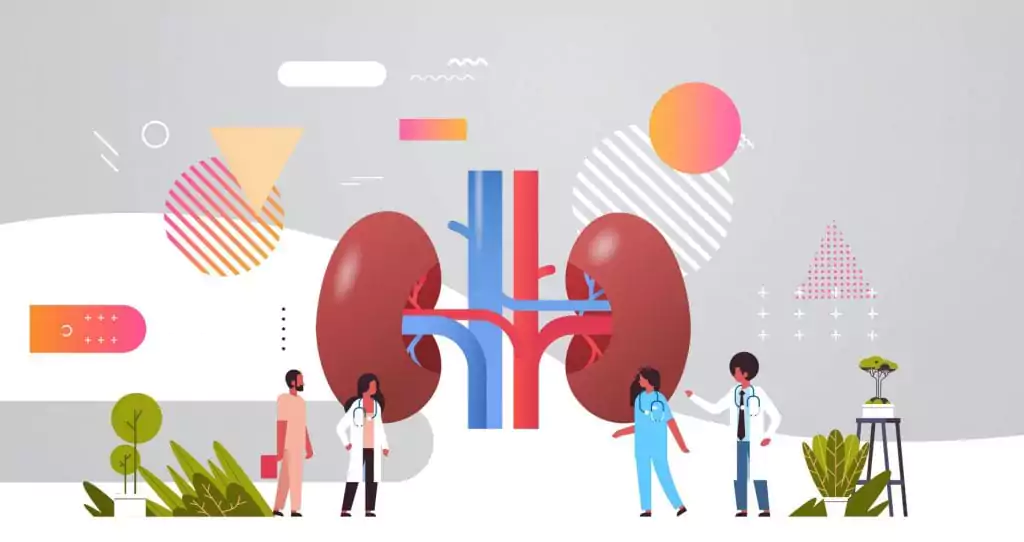





Diabetes and Kidney Disease: How to Prevent and How to Treat?


Table of Contents
- Diabetes is the most common cause of chronic kidney disease and end-stage kidney disease in the United States
- How does diabetic kidney disease develop?
- Does metformin cause kidney damage?
- What are the risk factors for diabetic kidney disease?
- What are the stages of chronic kidney disease (diabetic kidney disease)?
- What are the signs and symptoms of chronic kidney disease?
- How to manage, prevent, and treat diabetic kidney disease?
- Blood pressure control
- Control blood sugars
- Obesity and diabetic kidney disease
- Cholesterol and diabetic kidney disease
- Do I need to reduce protein in my diet when I have diabetic kidney disease?
- How to and how often to monitor diabetic kidney disease?
- How soon will I go to dialysis when I have chronic kidney disease?
- In summary
- How does remote diabetes monitoring help diabetes control and chronic kidney disease?
Did you know that chronic kidney disease due to diabetes is extremely common? And yet, most patients do not know that they have it. Only 10 percent of diabetic people with stage 3 diabetic kidney disease are aware of their diagnosis.
This unawareness is also common among people with stage 4 kidney disease with less than 60 percent of patients overall aware of their disease. Just so you know, stage 5 kidney disease means dialysis. So, how do you really prevent a problem that you are not even aware of? My job today is to help you understand diabetic kidney disease and diabetes so you can prevent it and hopefully never end up with dialysis.
Diabetes is the most common cause of chronic kidney disease and end-stage kidney disease in the United States
More than 50,000 people with diabetes who have end-stage kidney disease are on dialysis. As a diabetes specialist/endocrinologist in a diabetes care center, my job is to educate my patients about the complications of diabetes. This helps them prepare and prevent these complications.
How does diabetic kidney disease develop?
Blood sugars, when excessive, glue the cells together in the human blood. Think about how your fingers become sticky when you touch honey. When this happens, inflammation occurs. Because cells and chemicals attach together and accumulate on the blood vessel wall. This process starts a vicious cycle of inflammation.
Insulin resistance is the main mechanism triggering the process. As a result, people with insulin resistance or metabolic syndrome can still have kidney disease even without diabetes. Due to this inflammatory process and accumulation of inflamed cells, kidneys start to get larger. Initially, blood flow increases in the kidney.
This increased blood flow eventually burns your kidneys out. After a while due to the destruction of the cells within the kidney, blood flow declines. We define the blood flow process in kidneys as the "glomerular filtration rate" (GFR). When you look at your biochemical blood test you can easily identify your GFR.
Another important factor that happens in diabetes is that glucose absorption increases in the kidneys. This causes the blood sugar to remain high. A class of diabetic drugs including Jardiance, Invokana, Steglatro, and Farxiga work by decreasing glucose absorption.
These drugs help reduce the glucose load in the blood. Some of these drugs such as Invokana and Jardiance have also been shown to reduce the progression of kidney disease. They do that by reducing the stress on the kidneys.
Does metformin cause kidney damage?
As we discussed in our previous article, metformin does not dramatically damage to kidneys. On the other hand, patients with severely reduced kidney function may not filter and eliminate metformin correctly. Accumulation of metformin can lead to acid accumulation in the body and can be dangerous.
Your diabetes specialist will guide you on when to stop metformin. We do not typically stop metformin until a patient has chronic kidney disease stage IV. This recommendation is based on many studies and recommendations by major society guidelines.
What are the risk factors for diabetic kidney disease?
- Increasing age is definitely a risk factor. The longer you have diabetes and other risk factors the more chances are there to develop diabetic kidney disease.
- Raise/tonicity can be a risk factor if you are an African-American, Latino, or American Indian. Risk factors and these palpitations are higher than in Caucasians.
- Interestingly chronic kidney disease due to diabetes is more common in women than men.
- Diabetic kidney disease is also more common in people with a low socioeconomic status. People with low socioeconomic status tend to see doctors less often. They also tend to be less educated to prevent kidney disease. Since you are reading this article you are probably not at as high risk.
- Obesity has been listed as an independent risk factor even without diabetes. So, diabetic patients who are overweight are definitely adding more risk for diabetic kidney disease.
- Just like obesity, smoking can also be a huge risk factor independent of diabetes. When combined with diabetes smoking can be very detrimental to kidney function.
- If you have diabetes and your blood sugars remain high for years and years that will definitely put a huge toll on your kidneys.
- High blood pressure is also important in the progression of kidney disease. As a result in our diabetes care center, we always aim to control blood pressure along with diabetes.
- As in many diseases, genetic factors also contribute to the development of kidney disease due to diabetes.
- Acute kidney injury on top of chronic kidney disease is also more likely in patients with diabetes. They are more likely to be dehydrated. Dehydration can definitely trigger an acute or chronic kidney disease.
What are the stages of chronic kidney disease (diabetic kidney disease)?
Most of the time doctors will detect protein in the urine as the first sign of chronic kidney disease. At that stage, your GFR will possibly be normal or even higher than expected. When your albumin in the urine is between 30 to 300 mg/gram you have microalbuminuria.
If the number goes above 300 mg/g, we call that macroalbuminuria. Should this happen, the worsening of chronic kidney disease becomes faster. Normal kidney function (GFR) is considered to be above 90.
When GFR goes between 60-90, this is called stage II kidney disease. GFR between 30 and 60 is stage III kidney disease. When GFR between 15-30 is stage IV kidney disease. GFR below 15 is stage V kidney disease. Most patients with GFR below 15 will need dialysis.
What are the signs and symptoms of chronic kidney disease?
Signs and symptoms may be observed with advanced kidney failure, including volume overload(swelling in the legs, excessive urination at night), high potassium levels in the blood, low CO2 level in the blood, high blood pressure or worsening high blood pressure, anemia, and mineral and bone disorders.
By the time patients need dialysis they will have signs of uremia. These signs or symptoms include lack of appetite, nausea, vomiting, fluid around the heart, neuropathy, loss of concentration, and lethargy to seizures.
How to manage, prevent, and treat diabetic kidney disease?
Blood pressure control
Intensive blood pressure control is extremely important in addition to blood sugar control in diabetes. Blood pressure control not only reduces kidney disease progression but also reduces death from cardiovascular causes such as strokes and heart attacks. Remember chronic kidney disease itself is a risk factor for heart attacks and strokes.
Also, remember most patients die from heart attacks and strokes even before they end up with dialysis due to chronic kidney disease. The most common agents we use for blood pressure control in patients with diabetes are ACE inhibitors are angiotensin receptor blockers.
Control blood sugars
When it comes to controlling blood sugars as an endocrinologist I always aim for as low as reasonably achievable blood sugars. That means that we strive to keep blood sugar as close to normal as possible without causing significant low blood sugar (hypoglycemia). Keeping A1c less than 7 and if possible less than 6.5 is the ultimate goal for most younger patients.
For patients 80 years old or above or for patients who have too many problems making it difficult to prevent low blood sugar our A1c goal is sometimes higher. Continuous glucose monitoring systems such as Dexcom and Freestyle Libre are extremely helpful to help preventing low blood sugars as well as high blood sugars.
Obesity and diabetic kidney disease
Controlling obesity is another important factor. We try to use medications that can help with weight loss such as Byetta, Bydureon, Trulicity, Ozempic, Jardiance, Invokana, and Farxiga. These agents not only help with weight loss they also help with reducing the progression of kidney disease. The only problem with these agents is that they are very expensive. We work with the insurance company and patients to try to get them the most affordable and most effective medications.
Cholesterol and diabetic kidney disease
Reducing cholesterol levels especially LDL is extremely important. Most people resist the idea of cholesterol medications based on what they hear or see on the Internet or TV. Please read from reliable resources and watch people with credible credentials.
Do I need to reduce protein in my diet when I have diabetic kidney disease?
The role of protein restriction is unclear. I would avoid excessive protein and try to stick to 50 to 60 g of protein daily.
How to and how often to monitor diabetic kidney disease?
Patients with chronic kidney disease due to diabetes should be seen by their doctors for blood work every 3 to 6 months. Diabetes specialists/endocrinologists will also review blood pressure control and review the medications. In our diabetes care center, we target A1c, blood pressure, and cholesterol control altogether. This approach is the most effective approach to reducing chronic kidney disease.
How soon will I go to dialysis when I have chronic kidney disease?
Not all individuals have progressive loss of kidney function. Some studies show a high rate of progression, while others report a relatively stable disease. That depends on the degree of chronic kidney disease. It also depends on the risk factors as we discussed.
Patients who have good glucose control, as well as good blood pressure and cholesterol control, are lucky. And, if they are on the right medications to prevent kidney disease the chances of progressing to dialysis are much lower.
In summary
In order to prevent diabetic kidney disease and progression to dialysis, there are certain things we can do. First of all, you need to take your diabetes seriously. Secondly, you should not be depressed about it. Face it, manage it, and prevent it. Ask for help and guidance from SugarMD.
How does remote diabetes monitoring help diabetes control and chronic kidney disease?
Yes, we are all human. Staying on top of your diabetes, blood pressure, and cholesterol may not be easy at all times. That is why remote diabetes monitoring helps patients to stay on top of their game and be accountable. At SugarMD, we monitor our patients very closely, remotely, and conveniently.
We give them the correct guidance. We intervene on time. Instead of generic advice every 3 to 6 months when you see your doctor, as a progressive diabetes telehealth company we strive to give the best possible care without forcing you to the doctor's clinic.
Regardless of your personal equipment such as a regular meter, Bluetooth meter, Dexcom, or freestyle libre you can live your life and do what is important. Meaning, you do not have to stop your life to control your diabetes. If you have a phone you can take care of your diabetes and prevent complications of diabetes such as chronic kidney disease with SugarMD. With on-demand diabetes specialists and coaches, you will be in good hands.
Written By Dr. Ahmet Ergin
463 total articles
Meet Dr. Ahmet Ergin, a highly skilled and dedicated endocrinologist with a passion for diabetes care. Dr. Ergin earned his medical degree with honors from Marmara University in Istanbul. He completed internal medicine residency and endocrinology fellowship at Cleveland Clinic. Dr. Ergin is board-certified in Internal Medicine, Endocrinology, Diabetes, and Metabolism due to his vast medical expertise. He's a certified diabetes educator, author of “The Ultimate Diabetes Book,” and founder of “the SugarMD YouTube channel.” Dr. Ergin offers exceptional diabetes care to his patients in Port Saint Lucie, FL, helping them manage effectively. For a closer look into his insights and experiences, connect with Dr. Ahmet Ergin on LinkedIn, Instagram, and YouTube.”
Disclaimer: These statements have not been evaluated by the Food and Drug Administration. Information on this website isn't intended to treat, cure or prevent any disease. Discuss with your doctor and do not self-treat.
Products













